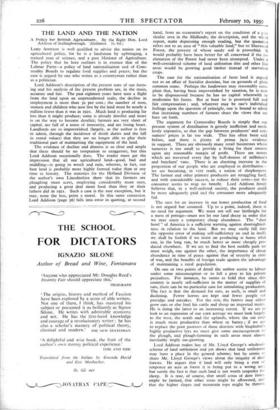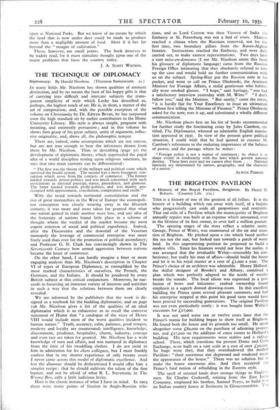THE LAND AND THE NATION
A Policy for British Agriculture. By the Right Hon. Lord Addison of Stallingborough. (Gollancz 7s. 6d.) LORD ADDISON is well qualified to advise the nation on its agricultural policy, for he is a landsman by upbringing, a trained man of science, and a past Minister of Agriculture. The policy that he here outlines is in essence that of the Labour Party—a policy of land nationalisation and of Com- modity Boards to regulate food supplies and prices; but the case is argued by one who writes as a countryman rather than as a politician.
Lord Addison's description of the present state of our farm- ing and his analysis of the present problem are, in the main, accurate and fair. The past eighteen years have seen a flight from the land upon an unprecedented scale; the decline in employment is more than 30 per cent.; the number of men, women and children who now live by the land must be nearly a million fewer than it was in 1921. Much land is producing far less than it might produce; some is already derelict and more is on the way to become derelict; farmers are very short of capital, are full of a sense of insecurity, and are losing heart. Landlords are so impoverished (largely, as the author is free tb admit, through the incidence of death duties and the fall in rental values) that they are no longer able to play their traditional part of maintaining the equipment of the land.
The evidence of decline and distress is so clear and ample that there should be no temptation to exaggerate, but this Lord Addison occasionally does. The reader must get the impression that all our agricultural land—good, bad and middling—is going to wreck and ruin, whereas, in fact, our best land is probably more highly farmed today than at any time in history. The statistics for the Holland Division of the author's own Lincolnshire show that its farmers are ploughing more acres, employing considerably more men, and producing a great deal more food than they or their fathers did in 1921. Such a case is the rare exception, but it may, none the less, point a moral. In this same connexion Lord Addison (page 56) falls into error in quoting, at second hand, from an economist's report on the condition of a par- ticular area in the Midlands; the description, and the whple report, make depressing enough reading, but the quotation refers not to an area of "this valuable land," but to Sherwood Forest, the poverty of whose sandy soil is proverbial. It would probably have been better for all concerned if the re- clamation of the Forest had never been attempted. Under a well-considered scheme of land utilisation this and other like areas would be growing good timber instead of starvation crops.
The case for the nationalisation of farm land is argued not as an affair of Socialist doctrine, but on grounds of plain common sense. Perhaps the landowner may reasonably com- plain that, having been impoverished by taxation, he is now to be dispossessed because he has no capital wherewith to modernise his farms. But at least he is promised full and fair, compensation ; and, whatever may be one's individual feelings upon the question of principle, one is bound to admit that increasing numbers of farmers share the views that are here set forth.
The argument for Commodity Boards is simply that our present system of distribution is grossly inefficient and need- lessly expensive, so that the gap between producers' and con-
sumers' prices is far too wide. This has often been said before, and there is plenty of prima fade evidence
in support. There are obviously many retail businesses whose turnover is too small , to provide a living for their owners upon any reasonable margin of profit. There are streets which are traversed every day by half-dozens of milkmen's and butchers' vans. There is an alarming increase in the proportion of our people who are employed in distribution— we are becoming, in very truth, a nation of shopkeepers. The farmer and other primary producers are struggling hard, and with considerable success, to reduce their costs—yet the consumer seems to reap no benefit. Lord Addison firmly believes that, in a well-ordered society, the producer could be more adequately paid and the consumer more adequately fed.
The case for an increase in our home production of food is not argued but assumed. Up to a point, indeed, there is no need for argument. We must not sell our birthright for a mess of pottage—must not let our land decay in order that we may enjoy a temporary cheap abundance. The "dust bowl" of America is a sufficient warning against shortsighted- ness in relation to the land. But we may easily fall into the opposite error of making self-sufficiency an end in itself; we shall be foolish if we insist on producing at home what can, in the long run, be much better or more cheaply pro- duced elsewhere. If we are to find the best middle path we must weigh, one against the other, the importance of cheap abundance in time of peace against that of security in time of war, and the benefits of foreign trade against the advantage of maintaining a rural population.
On one or two points of detail the author seems to labour under some misconception or to fall a prey to his private prejudices. For instance, he seems to hold that since this country is nearly self-sufficient in the matter of suppliss of oats, there can be no particular, case for stimulating production. The fact is that the demand for oats, as such, is small and declining. Fewer horses are kept and fewer people eat porridge and oatcakes. For the rest, the farmer may either grow oats or else feed his cattle and sheep on imported maize. He is doing the latter to an increasing extent. If we are to look to an expansion of our corn acreage we must look largely to the west, the north and the uplands, where the oat crop is much more productive than wheat or barley ; if we are to replace the poor pastures of these districts with Stapledon's highly productive leys we must give some encouragement to the plough, and plough-farming in such areas must almost inevitably imply oat-growing.
Lord Addison makes hay of Mr. Lloyd George's wholesale scheme of settlement and yet shows that land settlement may have a place fn the general scheme; but he seems to share Mr. Lloyd George's views about the iniquity of deer forests. He argues that if land will only bring a rent of tenpence an acre as forest it is being put to a wrong use; sheep. It is true, of course, that small areas • of deer forest -tenpece for but surely the fact is that such land is not worth ti might be farmed, that other areas might be afforested, and that the higher shapes and mountain tops might be thrown open as National Parks: But we know of no means by which the land that is now under deer could be made to produce more than a negligible amount of food. Most if it lies far beyond the "margin of cultivation."
These, however, are small points. The book deserves to be widely read, for it must stimulate thought upon one of the major problems that faces the country today.
J. A. SCOTT WATSON.















































 Previous page
Previous page